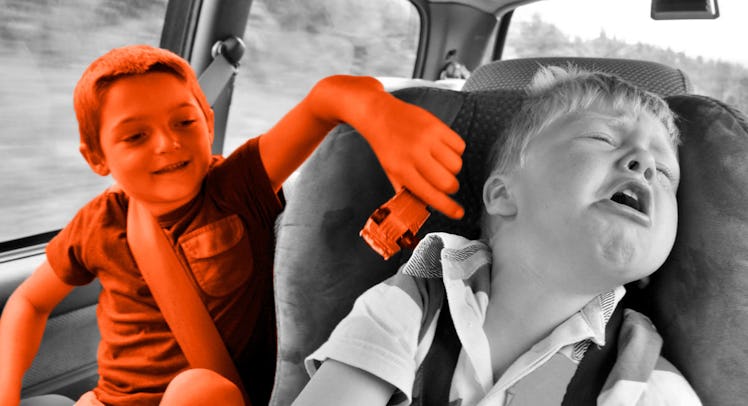How to Discipline Children in the Car
Patting your head while rubbing your belly? Yeah, it’s sort of like that, but a lot more stressful and dangerous.

Near the top of every parent’s list of discipline nightmares is trying to deal with rambunctious or screaming children in the car while driving. Take your eyes off the road to check out the crime scene? Risky. Yell at the youngsters to stop fighting? Hard when you’re not sure which one was the instigator. Threaten them with loss of TV privileges or another punishment? Usually falls on deaf ears. Clearly, your choices are limited in this situation. Here are the two primary options before you — and how to succeed at both.
Handling It Now
The odds that words alone will be enough to squelch the chaos rises exponentially if you are dealing with just one child. In a calm but firm voice, say something simple and direct, like: “The noise from your game is too high and it is making it difficult to drive. I need you to either turn it down, or stop playing until we arrive.” With some luck, your child will comply.
RELATED: How to Talk to Teachers About Discipline That Happens in School
“Honestly, I almost never hear of car problems that involve one child only,” says parenting expert Bonnie Harris, author of When Your Kids Push Your Buttons. “That doesn’t mean there aren’t any, of course. But a parent’s request to stop an inappropriate behavior is more likely to be heard because there is no other dynamic going on with another child.”
Didn’t do the trick? Your next step is the same regardless of whether you have one munchkin in the backseat or four is to stop the car. Pull off at the closest exit, or stop on a service road and let your kids know the car won’t be moving again until the aforementioned noisemaking toy has been silenced.
In the case of squabbling siblings, try this tactic: Get out of the car and leave your kids to resolve the fight themselves. “Tell your kids, I see you have a fight going on. I am going to step outside until you are able to sort it out,” says Harris. Worried this will only allow the issue to escalate? You’ll likely be surprised: Siblings often take their cues off parents, relying on them to solve the problem at hand; when the parent is no longer in the picture (as you were in the front seat driving, even if you didn’t know it), it can suck the air right out of whatever fight they were having. “Tell them you’ll be right there and they can knock on the window once they’re ready to go again,” says Harris. “It may be sooner than you think.”
ALSO: The Biggest Lies Parents Tell Themselves About Discipline
Handling It Later
If your child’s behavior is not so egregious as to put you at risk for an accident, you might consider (after unsuccessfully requesting a change in behavior) holding your tongue until a later time when you are at home. “Wait until you are able to talk in a calm way with your child,” says Harris. “When a parent speaks in steady tones rather than yelling, the child is likely to be more receptive to the conversation.”
What’s more, don’t expect kids to understand the stress of driving in traffic, says Harris. You need to lay it out for them — when they shout in your ear, it catches you off guard and can make you swerve the wheel; when they are physically pinching and pushing each other, it makes you take your eyes off the road which is very dangerous.
Once you convey the challenges of driving, establish a “noise meter” for your kids, suggests Harris. Have it range from 0-5 with 0 equaling silence and 5 being max loudness (which also means dad stops the car). “Practice at home,” she says. “When you say ‘Zero,’ the kids must be silent. When you say 5, everyone shouts. Next time you are in the car and the kids are getting rowdy, you can say, ‘Hey guys, the noise meter is at 2.5 right now. If it hits 3, I am going to have trouble driving. Can we dial it back to a 2?’” It takes practice, but by turning a behavior problem into a family game, you stand a better chance at arriving safely — and sanely — at your destination.
Read more of Fatherly’s stories on discipline and behavior.
This article was originally published on